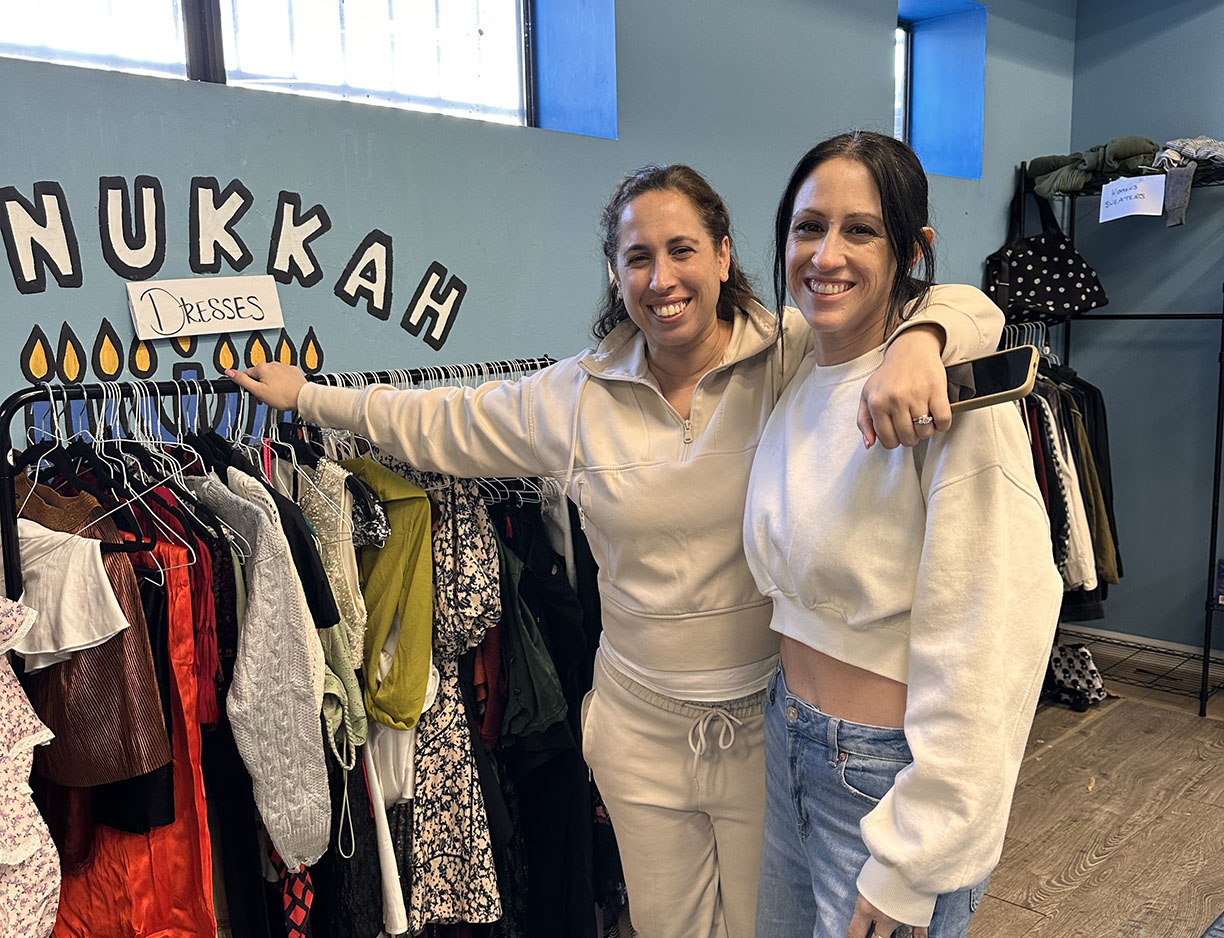After the devastating fires that ravaged Los Angeles County in January, Jewish organizations all around town have stepped up to provide free shopping experiences for fire victims. Having collected thousands of items, they are now trying to get the word out to all fire victims.
The Journal spoke with three organizations and a restaurant that want you to share this with people who need it.
Even a month after the Palisades and Eaton fires began on Jan. 7, tens of thousands of displaced people from Malibu to Altadena are still struggling to find clean underwear, hygiene products, deodorant and supplies for young children. Even the people whose homes are still standing are forbidden to return due to health hazards and mudslide risks.
Maman Nonprofit’s Boutique in Tarzana
One place wildfire victims can go shopping in-person for free is the Maman Nonprofit’s boutique at Eretz Cultural Center (6170 Wilbur Ave., Tarzana). Eretz is near the midpoint between the greatest loss of life and property from the fires. Located just south of Victory Boulevard in Tarzana, Maman’s boutique is about 36 miles from the easternmost extremity of the Eaton Fire, and 20 miles from the western extremity of the Palisades Fire in Malibu.
Maman’s boutique is in a children’s multipurpose room at Eretz Synagogue, and their inventory is neatly arranged, folded and displayed like a Kohl’s department store. Almost all of the goods there are brand new, with the exception of a few pre-worn dresses and formalwear dropped off during the Journal’s visit.

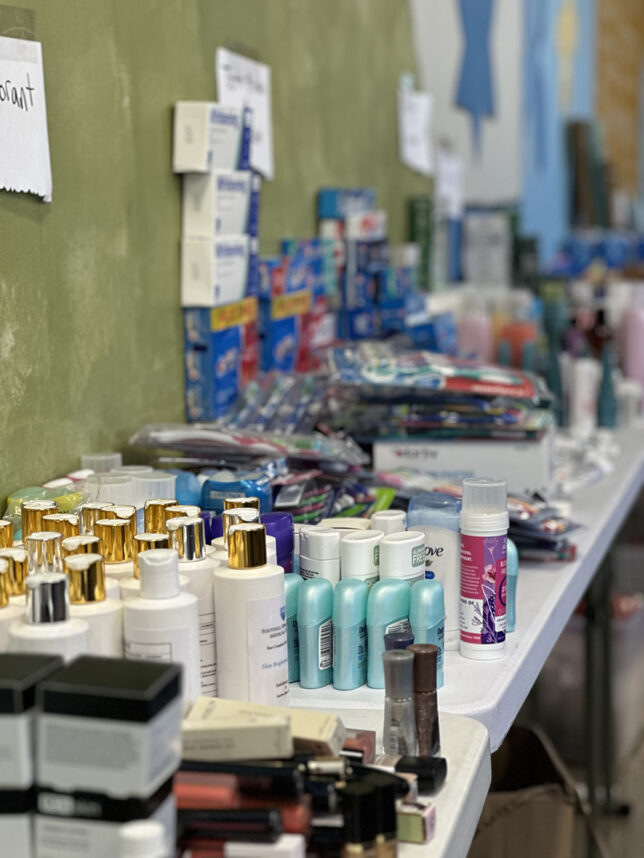
Maman Nonprofit founder Sara Raoof Jacobs runs a WhatsApp group of over 400 Jewish community members, mostly women, who have spent the last 15 months stepping up for Israelis in the wake of the Oct. 7 Massacre — shipping necessities for Israeli soldiers, hosting retreats for victims in Los Angeles and creating an outlet for many to put their selfless energy into action.
“It’s so nice for volunteers to have that full circle moment where volunteers see the recipients receive so much in person,” Jacobs told the Journal. “They come in, it looks pretty, they shop, they feel good.”
Jillian Williams, whom Jacobs co-deputized to lead the boutique operation, was in the process of arranging a rack of men’s jackets with her mother-in-law, Sandee Quigley, when she spoke with the Journal.
“As soon as the fires happened, Sara spoke to us right away and we found out that almost an entire congregation [in Palisades] had lost their homes and everything inside,” Williams told the Journal. “We immediately set to work to create what started off as an Amazon wishlist format so that families could specifically order privately what they wanted or what they needed. Our community of donors started mailing in a lot of items.”
Williams said most of the victims that come to shop at the Maman boutique are just looking for things most people take for granted — soaps, diapers, baby formula, basic clothing and bedding. One of the Maman volunteers owns a mattress factory in the Valley, so one of the first logistical challenges that Williams and her co-leader, Liz Zvingler, faced was shipping dozens of customized mattresses. Zvingler started volunteering for Maman after the Franklin Fire broke out in December.
“I love volunteering in my free time and I especially love having my kids join when they can,” Zvingler told the Journal. “It’s important for me to show them that there are people struggling in the world and that we should help whenever we can. Maman is an organization that could help people at the drop of a hat. Everyone is willing to drop everything to organize a delivery.”
Williams said her ten-year-old daughter is quickly learning the value of volunteering and helping in the community by showing up with Maman.
“This makes me feel like I’m raising a really empathetic and caring person,” Williams said.
Williams and Quigley were prepping about a dozen 20-gallon plastic containers filled to the brim with bottles and containers of toiletries. The following day, ETTA, an organization that empowers people with disabilities to be included and live independent lives, would be sending some volunteers to help organize the boutique.
Still, many fire victims are reluctant to come in person for the items they need.
“One thing we’ve seen a lot is a hesitation with these people who have lost everything to come in and take and accept free help or charity,” Williams said. “It’s very important that anyone who wants to should feel very comfortable. We make it very private and very casual so that it’s not an uncomfortable situation. We have a store full of things. We want everyone to come and not feel shy to do that. That’s what it’s here for.”
The distribution process is evolving as more shoppers come by to stock up. Already, there have been many heart wrenching moments.
Williams took a phone call from a mother who had been stuck inside an elevator with her daughters in an office building in Palisades when the power went out on Jan. 7. They called 9-1-1, but rescuers were occupied with fighting the growing fires. They were eventually freed from the elevator, but when they emerged, their lives were forever changed.
“By the time they got out, one of the authorities who arrived to help them also informed them that they had lost their house,” Williams said. That mother showed up to shop at the boutique on Feb. 10.
Zvingler recalled a deaf couple who came to the Maman boutique with a newborn baby.
“Not only were they trying to balance out work with a newborn baby, but now they have lost everything,” Zvingler said.
A UCLA chapter of Maman recently formed by students, Jasmine Golshan and
Shannon Broman. Jacobs said Golshan and Broman contacted over 1,000 hygiene product brands throughout January. As of press time, they are prepping them for a distribution spot at or near campus.
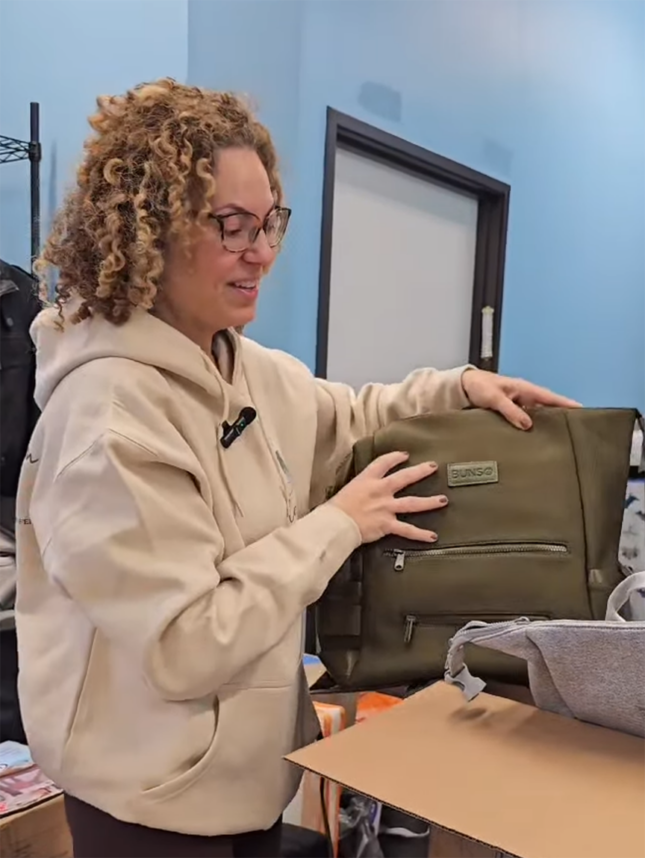
To get a sense of the fast pace and scale of the Maman operation, I volunteered to fill my vehicle full of heavy bags and courier another donated supply of hundreds of beauty products. The Maman WhatsApp group had trouble finding someone who could move the bags during a narrow time window from West Hollywood to Eretz in Tarzana during the evening rush hour. The woman who handed me the bags didn’t know the people volunteering at Eretz, and she certainly didn’t know me. But there’s a trust and kinship amongst the Maman volunteers where they know that no matter what, someone will step up.
The boutique operates by appointment only, Monday through Thursday from 12 p.m. – 2 p.m.. Fire victims can browse and select the items they need, and for those unable to visit, volunteers are coordinating deliveries.
As the situation is fluid, Jacobs is encouraging any fire victims to contact Maman via direct message on their Instagram www.instagram.com/mamannonprofit or at their website www.mamannonprofit.com to book an appointment to visit the boutique or request care packages.
Chabad Malibu’s Closet of Love
Chabad of Malibu has transformed most of its space into Closet of Love, another donation and distribution center offering free essential items to fire victims. On Jan. 7, as the fires approached Malibu, Rabbi Levi Cunin stayed back to protect the property during the evacuations. On Saturday, Jan. 11, his wife Sara and their children returned. By the morning of Sunday, Jan. 12, volunteers had already begun transforming the synagogue’s foyer into a donation and distribution center.
Chabad received so many donations that they have streamlined their stock to new items only. Their space is still packed with brand-new items ready to go to those in need.
“A big part of our job also is to receive,” Sara Cunin told the Journal. So if somebody shows up here at the door with used items, no matter what, we receive items because of their mitzvah to give. If we feel the items are suited to stay here, we keep them here. If not, we’ve partnered with other charities where the items might be better suited.”
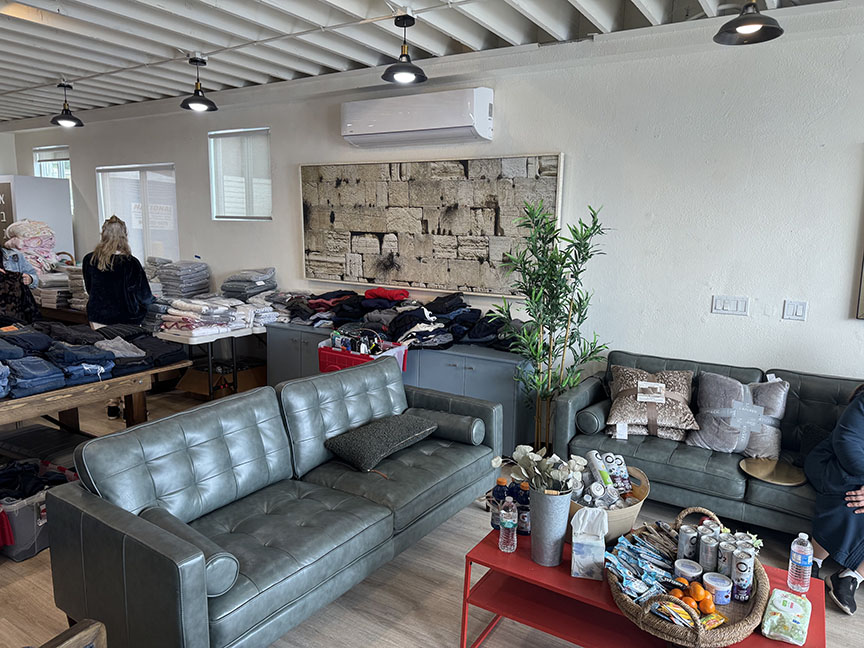
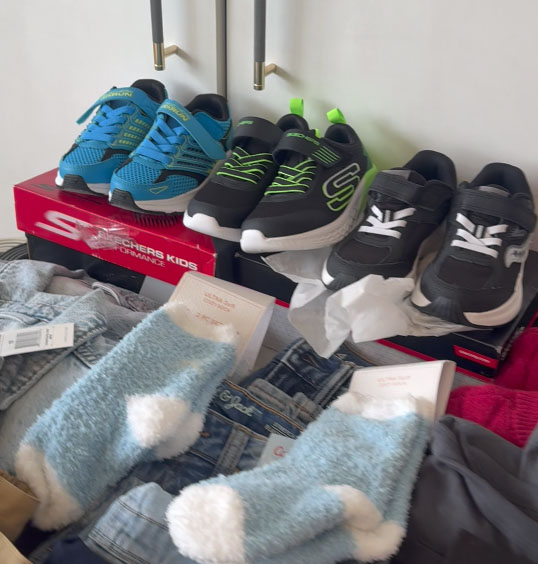
Since opening, the Chabad showroom has seen a steady stream of families returning as new donations arrive. Closet of Love is located right on the edge of the fire footprint. At the time of the Journal’s visit, the area was still restricted to first responders, utility, residents and media. No surfers jaywalking across the Pacific Coast Highway. The historic Malibu Pier was deserted.
When you walk in, there’s a coffee table filled with oranges, granola, nuts and sparkling water. To the right is a nine footwide photograph of the Kotel on the wall, looming above a cabinet piled high with fleeces. Next to that cabinet is a folding table stacked high with brand-new linens in their plastic packaging.
“People who lost everything — you would think they would come in here and excessively take whatever they can,” Cunin said. “They don’t. People even feel guilty. Many have been in the position to give in the past, so they hesitate to take. We almost have to say, ‘No, you need this right now. When you’re ready to pay it forward, you will, but you need to take this right now.’”
Cunin said that some of the most requested items have been socks, toiletries, water bottles and yoga mats. Earlier in the day, a family took a brand-new Keurig K-Cup coffee maker and some pots and pans.
Beyond distributing supplies, Chabad of Malibu has created a space where people can walk in and get emotional support.
“This isn’t just a place to pick up supplies, people come in just to sit, have a coffee, and be somewhere that feels safe,” Cunin said. “Sometimes, they just need a hug.”
For volunteers like Tilly Feldman, the effort has become part of daily life.
“When I wake up in the morning, I’m like, oh … I just do it,” Feldman said. She has driven 35 miles each way from Granada Hills to Malibu six days a week for the past three weeks to volunteer at Closet of Love. “One or two times, I remember I stayed home and it didn’t feel right to stay home. Those days just didn’t feel right, so come here.”
In front of the front window is the brightest section of the inventory — brand new Barbie dolls, laundry baskets full of plush stuffed animals, shelves of children’s books, and containers filled with colorful wooden blocks.
“So come by here and sit, have coffee, get a nice hug, grab a snack, sit here, maybe get food from Pita ‘Bu (a kosher restaurant next door) and sit with people,” Cunin said. “Some of the Jewish families, they’ve come in, once they’re here, we realize, ‘okay, you need a mezuzah, come, we’ll get some for you.”
Closet of Love is open Sunday through Thursday from 10:00 a.m. through 5:00 p.m. On Fridays they are open from 10:00 a.m. to 2:00 p.m. and on Saturdays they are closed for Shabbat. Fire victims in need of supplies can shop at Chabad of Malibu at 22933 Pacific Coast Highway.
For the latest logistics on Chabad of Malibu’s Closet of Love, visit JewishMalibu.com, follow them on Instagram at www.instagram.com/chabadofmalibu, or call them at 310-456-6588.
Pita ‘Bu’s Free Kosher food
Next door to Chabad of Malibu is Pita ‘Bu, the only kosher restaurant in any direction for 20 miles. Their slogan is “where Tel Aviv meets the ‘Bu.” They have been operating at this location on the PCH for two years. Since Jan. 29, Pita ‘Bu has been providing falafel, hummus, fish tacos and several menu items for free to first responders and fire victims.
“We started this with a generous donation from someone in our community, and soon after, World Central Kitchen reached out to us to partner on a larger scale,” Pita ‘Bu co-owner Ronnie Benarie told the Journal. “We’ve been giving out free, healthy, nutritionally balanced meals to anyone who needs them.”
The generous donors are Kevin and Claudia Bright. Kevin is best known as an executive producer of the NBC show “Friends.” Claudia runs the nonprofit, Dogs of Violence Exposed (DoVE) Project, which aims to end the dog meat trade in South Korea.
Pita ‘Bu has become more than just a place to get food — it has served as a community hub for displaced locals to catch up with each other.
“We’re seeing people from the Palisades through Zuma coming together — many times people who haven’t seen each other in a long time are reconnecting here,” Benarie said. “Some just come by to sit, have a meal, and relax. We’re not a food truck, and we’re not a large-scale operation. We’re just a mom-and-pop shop feeding whoever we can.”
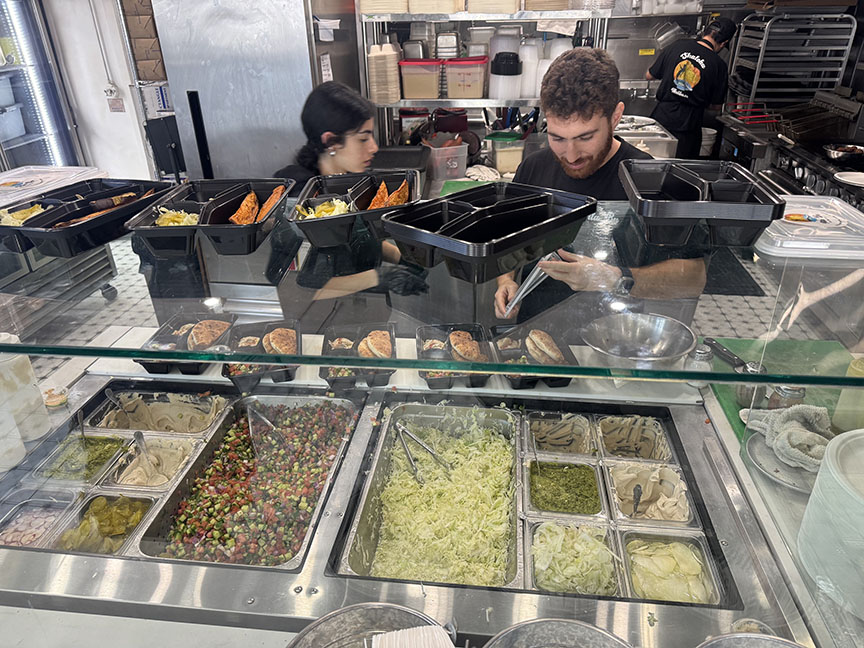
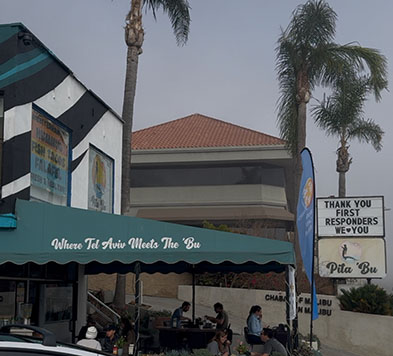
“The best part of this has been the reactions,” Pita ‘Bu worker Tamar Asayag told the Journal. “People are emotional. Some have just come from their homes, realizing everything is destroyed. When they see that we’re here providing them with a meal and a place to gather, it gives them a little comfort.”
Anyone in need can stop by Pita ‘Bu, located next to Chabad of Malibu, for a free meal. There are no restrictions. “Anybody who needs it can come and take a meal,” Asayag said. “It’s not limited to anything. Everyone is welcome.”
As of press time, Pita ‘Bu was still offering a free meal to anyone who comes by. Even after the free meal promotion ends, the Pita ‘Bu food and staff generosity are very much deserving of your business.
Check the Pita ‘Bu Instagram www.instagram.com/thePitaBu (424) 235-2477 for the latest information about what they’re doing to help the community.
Rebuilding Judaica
Many families in Los Angeles lost not only their homes in the fires but also their Judaica collections — some dating back over 100 years. To address this, entrepreneur Amy Conroy and her 15-year-old daughter, Chloe, launched Rebuilding Judaica, a grassroots effort to replace Shabbat candles, kiddush cups, mezuzot, menorahs, seder plates and more.
“LA is broken, and everyone is working hard to rebuild,” Amy Conroy told the Journal. “Chloe and I are organizing a way to bring the community together and help families create a sense of ‘home’ through the little things.”
The mother-daughter team started collecting items on Jan. 15. Originally, their project began as an Amazon wishlist of Judaica for displaced people. Since then, as of press time, donations have been mailed to the Conroys from 14 U.S. states, including those with small Jewish populations like Nebraska, Montana and Idaho.
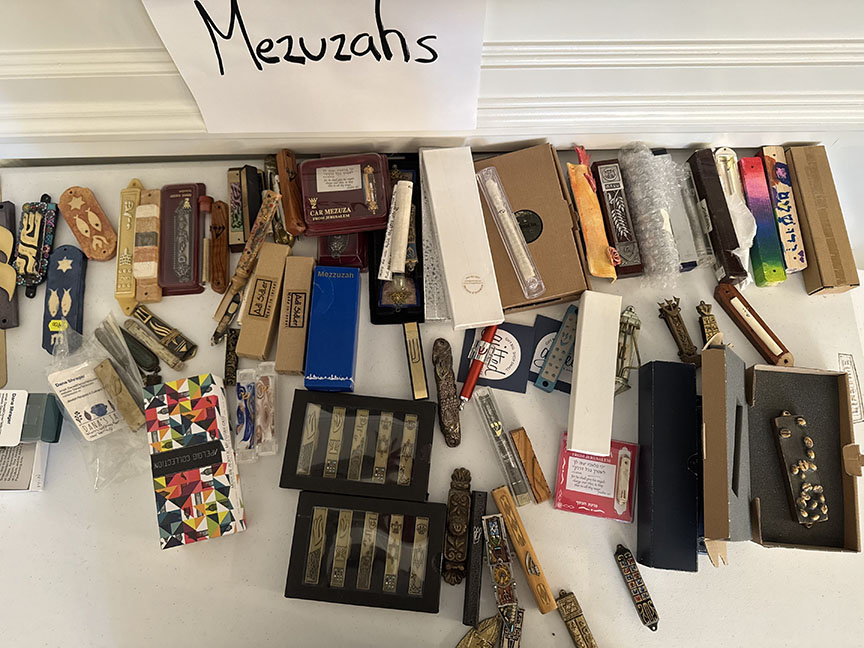
“No one’s looking to run out to the Jewish store,” Chloe told the Journal. “So we’re going to drop [Judaica] off at their doorstep after we get their rental addresses.”
Amy and Chloe made it clear to donors that they don’t want people to just offload their junk. Their directions to donors are to “only send nice items you would proudly display on your Shabbat table or in your home, new and used.”
For four consecutive Fridays, from Jan. 17 through Feb. 7, donors could drop off of Judaica at Wilshire Boulevard Temple. The collection has swelled to thousands of items, filling up entire rooms of the Conroy’s home. Amy and Chloe have carefully itemized each donated item and tagged them with the name of the contributor.
“One day down the line, there’s a personal connection, whether a text or a phone call being like, ‘Hey, Joe, I’m using your candlesticks. Thank you so much,’” Amy Conroy said.
They have already compiled a list of 450 Jewish households in Los Angeles in need of replacing their Judaica.
This isn’t the first time that the Conroy’s have sprung into action for the community in crisis. On Oct. 8, 2023, the day after the Hamas’ massacre in Israel, the Conroy’s and their friends raised almost $1 million in relief funds for the victims. Amy remarked that it was a full family effort — her children and her friends’ children were even helping with donors in learning to use QR codes and donation websites. One year later, Amy and her husband Brad were part of a group of donors at Wilshire Boulevard Temple who donated three brand-new Magen David Adom ambulances to Israel on the one year anniversary of the attacks. Each of the custom ambulances costs hundreds of thousands of dollars.
PHOTO:
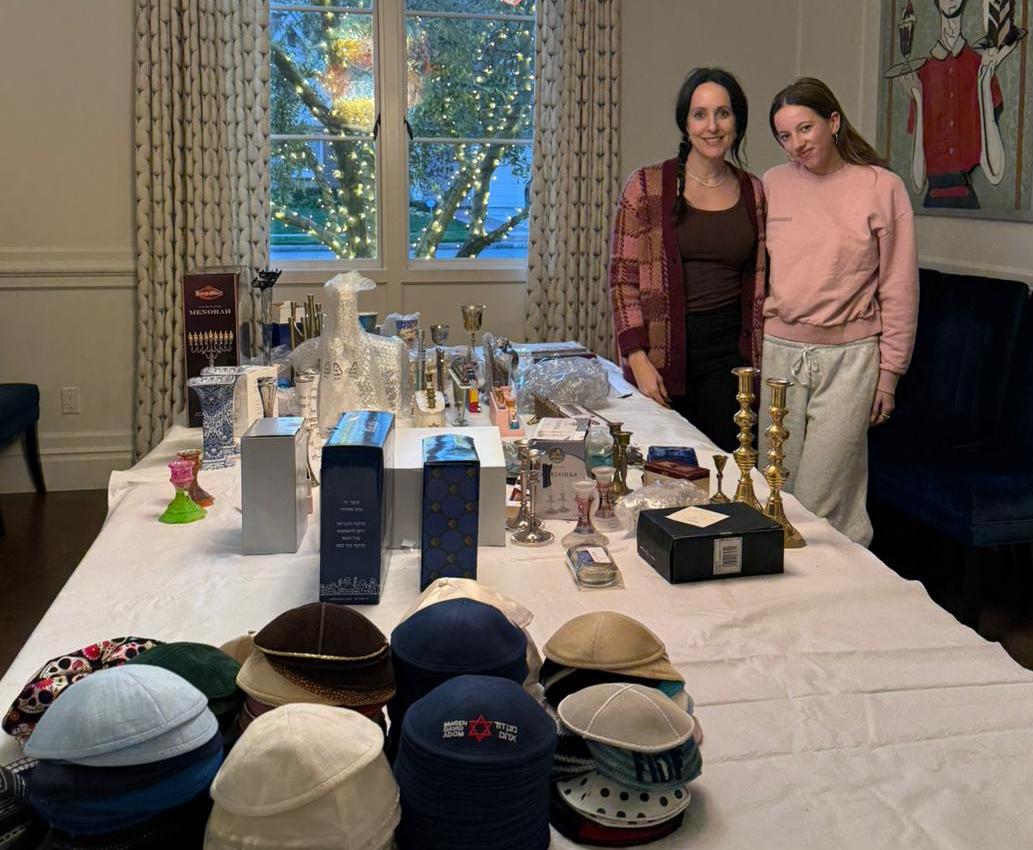
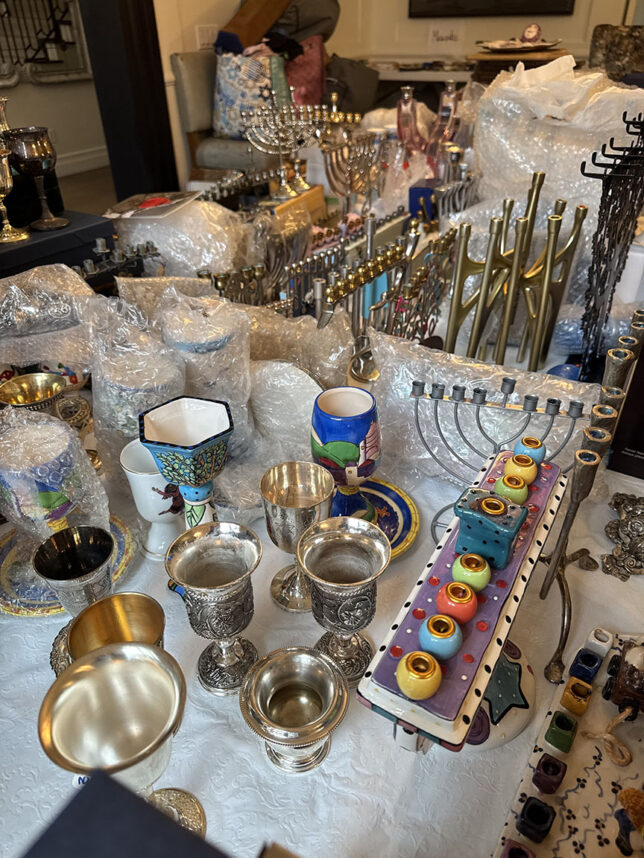
With Rebuilding Judaica, the Conroy’s are also helping replenish something that many Jew might not realize they have been collecting.
“When we were collecting kippahs, we asked people ‘Are you okay if the kippahs have the Bar and Bat mitzvah dates on them?’” Amy said. “Honestly, every Jewish person has that one kippah drawer with all the different mismatches. And that’s a small thing that no one’s looking to get back, but at some point, is going to be missed.”
To find out more about Rebuilding Judaica, Amy is directing donors and fire victims to contact her on Instagram www.instagram.com/amyjillconroy or via email at [email protected].

